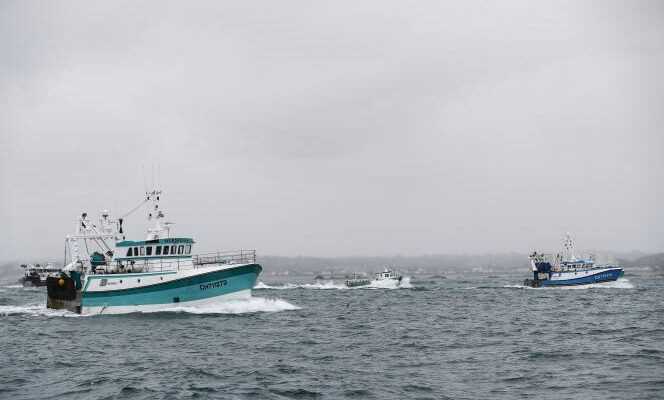For the first time since Brexit took place almost five months ago, the particularly strained relations between the European Union (EU) and the United Kingdom should be on the menu of the European Council on Monday 24 and Tuesday 25 May, in Brussels. Paris insisted that this subject be placed on the agenda: it will probably be a question of fishing, after the clashes between French fishermen and the Jersey authorities at the beginning of May. The British have in fact changed without notice the conditions for granting licenses to European fishermen in the Channel Islands. What’s more, negotiations are slipping over the volumes by species that fishermen can catch in UK waters in 2021. “There is a moment when it will clash”, warns the MEP (Renew Europe) Nathalie Loiseau.
The Twenty-Seven should also tackle the question of the even more delicate “Northern Irish protocol”. This part of the divorce treaty, approved by Boris Johnson more than eighteen months ago, defines the hybrid status of the province, still a member of the United Kingdom after Brexit, but remaining partly in the European internal market, in order to avoid a customs border on the island of Ireland. By establishing the border at sea, between the North Irish ports and Great Britain, this protocol aroused deep discontent in the Northern Irish loyalist community, viscerally attached to its British identity.
To calm it down, the Johnson government decided in February, without any consultation with the Twenty-Seven, to move from 1er April to October 2021 the implementation of sanitary and phytosanitary controls, now necessary between Great Britain and Northern Ireland for supermarkets. Deeming the process contrary to the terms of the divorce agreement, the European Commission launched on March 15 infringement proceedings against London, which responded with a letter on May 14. If the European executive is not satisfied with its content, it can go so far as to refer the matter to the Court of Justice of the EU. “We are analyzing this response, it will take time”, we let the Commission know.
The worry rises
Despite this dispute, the Commission continued its dialogue with London. Its vice-president, Maros Sefcovic, is proposing to David Frost, the British Minister for Brexit, an alignment with community sanitary and phytosanitary standards, which would remove most of the controls in Northern Irish ports. This is out of the question for Mr Frost, who defends a simple principle of equivalence between European and British standards, an option rejected by Brussels which considers that it does not sufficiently protect its internal market.
You have 52.9% of this article to read. The rest is for subscribers only.
